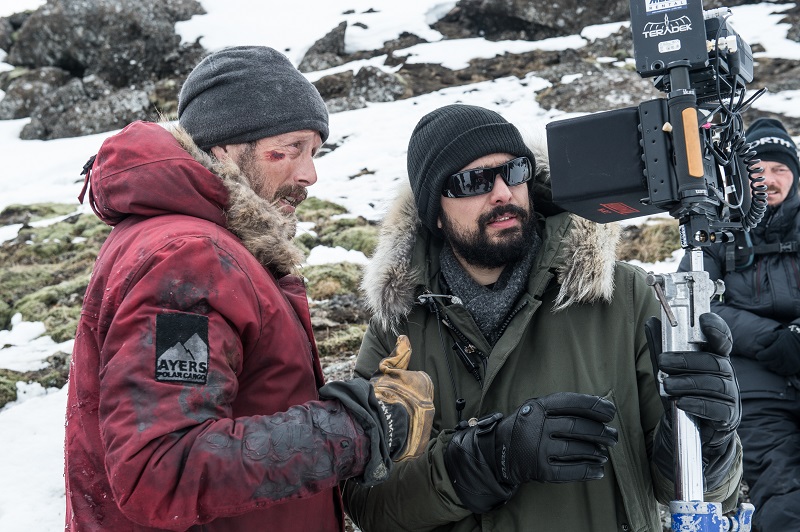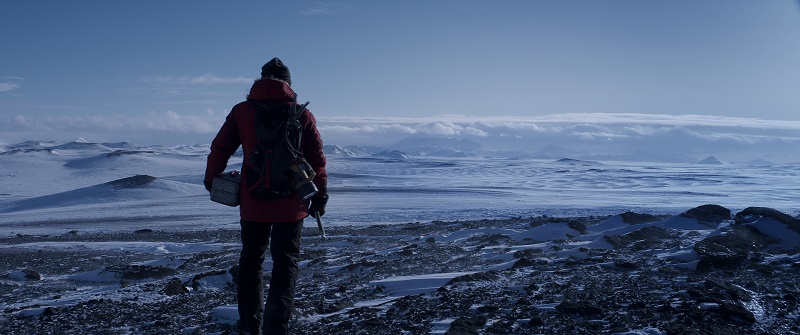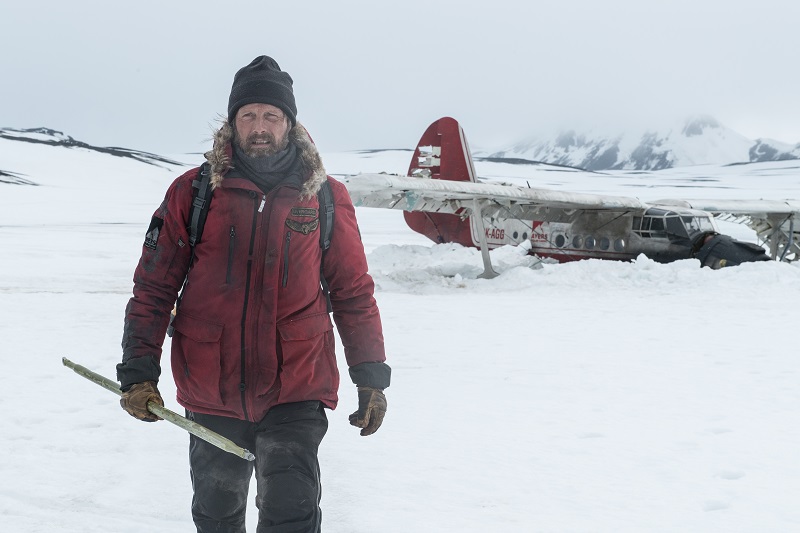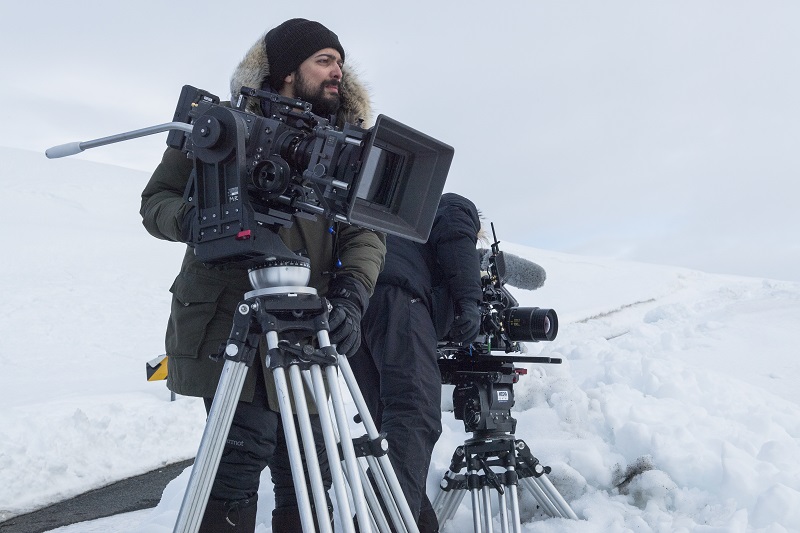Arctic is a survival story for the ages. Its stunning, emotionally gripping, power can be traced to its star, Mads Mikkelsen, and the film’s co-writer and director, Joe Penna.

Mikkelsen stars as a man stranded in the titular part of the planet after his plane crashes. There is little hope for survival, yet he perseveres. The film is riveting and although there is little dialogue, it possesses a resonance that few films can achieve with the richest of prose. The Danish actor turns in the performance of his career and together with director Penna, the two set out to battle the elements in real life to craft a survival film to top all survival tales.
The Movie Mensch caught up with Penna for an exclusive chat where we talked the triumph that is Mikkelsen, the immense obstacles that the helmer faced—between the weather and gear failing—as well as his thoughts that being a filmmaker is an ongoing learning curve that should never see its end. One thing is for certain, what Penna learned and achieved in Arctic must serve as a Master Class for moviemakers everywhere.
The Movie Mensch: There is a common thread in several of your films, Turning Point and now Arctic, and it is the uncanny ability for humans to fight for survival. Why is that such a source of inspiration for you?
Joe Penna: It’s such a primal instinct that we have as human beings have, or even animals and any multi-celled organisms, for fighting to survive. Even viruses, they’re not even alive, and they want to go on. It’s such a great story to tell without dialogue. You can easily understand—OK, he’s hungry. He wants to get out of there. It just makes so much sense to anybody watching it.
The Movie Mensch: Cannot talk about Arctic without heaping loads of praise on Mads. One can count on one hand the number of performers that can carry a movie successfully on their own. What is it about Mads that you saw that you knew he could carry Arctic and everything that goes along with that incredible task?
Joe Penna: I watched two films of his, back to back. I watched The Hunt and then I watched Men & Chicken—which is a crazy Danish comedy that he was in. I wasn’t sure which character was Mads Mikkelsen when I first started watching Men& Chicken! I knew that my film was somewhere in between those. You watch something like Valhalla Rising where he’s doesn’t speak throughout the whole film, there is so much he can say with just a look, a twitch, a grunt, that was 100-percent necessary. You’re right, there’s maybe four or five actors who can pull this off. We have the list of actors who have been in things similarly—like Tom Hanks—and thankfully for us, Mads Mikkelsen was at the top of the list.
The Movie Mensch: Beyond a stellar performance, what was Mads like as a creative collaborator? I mean, it’s just you two out there, with Maria of course as well.
Joe Penna: When you get someone like that for your film, you start wondering if it’s going to be placing the camera in front of Mads Mikkelsen and pressing the little red button and saying, “action” and he does his thing. Or, is it going to be incredibly collaborative? I didn’t know what I was going to get until we got into rehearsal. There was so much trust that he was placing in me, in terms of how far to take certain moments and which lines to cut and which lines to expound upon in the script. I knew right away that it was going to be a great collaborative process.
The Movie Mensch: The shoot looks perilous, and frankly cold! Would you describe the Arctic shoot as taxing physically, mentally or both?
Joe Penna: It was mentally, especially. It was the most difficult thing. A film itself is so difficult to pull off. Just, any film—even shooting on a sound stage is difficult. Living in the Arctic, not only trying to produce a film out there, there were problems with gear, snow and the weather not being consistent. Every single hour of every single day was a new puzzle for us to try to put together. My editor said we became little movie machines and how we tried to figure out how to do this in 19 days.
The Movie Mensch: 19 days?!
Joe Penna: Yeah, that’s what we ended up with after losing days to weather and all the things that were thrown our way.

The Movie Mensch: Writing is normally such a solitary endeavor. You have a prose partner, as I like to call it, in Ryan Morrison. First, what are the benefits you find to writing as a team and second, what is it about Ryan that brings out the best in you?
Joe Penna: Ryan is, ironically for this film, great at dialogue. He’s got such a great voice. I think my characters can sound a little bit robotic, I’ll say. I’m the kind of the “this must happen and that must happen”—the logic kind of guy, and he’s the emotional kind of guy. He kept the emotional thread of the screenplay throughout and I kept the logic thread throughout. I think we work well together that way. We had a producer come in and watch all of our dailies and she was like, “I need you guys to explain to me how this is going to cut together into a film.” [Laughs]. We showed her some of the edits that Ryan was putting together as we were shooting. She said, “Good. I was worried for a second there. I see what you guys are doing.” It’s great to have that person to give you a little nod that I’m doing the right thing.
The Movie Mensch: Is it safe to say your filmmaking confidence has gone up with this astounding achievement?
Joe Penna: Definitely. Every project you do whether it’s a massive failure or whether it’s a great success, it helps you become a better filmmaker regardless. Because then you start realizing, “OK what did I do that wasn’t working? What could have done differently?” If I ever work on a project and I think that it’s perfect, then I know that I have reached my limit. I shouldn’t find a project perfect. I watched Arctic—which I’ve seen 80 or 90 times—I know what could have been. That’s the mark of a great filmmaker. I strive for never thinking that what you’ve done is flawless.

The Movie Mensch: I wanted to ask you about the choices for the score. There is a lot of silence in terms of lack of dialogue. A lot of emotion expressed in Mads’ face and it’s accompanied and enhanced by the score. Although sometimes, it’s just accompanied by the sound of the wind or the elements. Could you talk about those choices…
Joe Penna: That’s takes a lot of courage from a composer. I did a temp score for it and I over-temped it. Kudos to composer Joseph Trapanese (Straight Outta Compton, The Greatest Showman), who did the score on this film. He’s such a seasoned pro. He pointed out the points in the film and he said, “I don’t think you need a score for this [part]. I don’t think you need a score for this [part]. I’m not trying to be lazy here, I’ll write a cue for that part for you. But I don’t think that you need help with the emotion.” He kept saying what moments of the script need a little help with emotion and moments that don’t need that—let them play as they are.
The Movie Mensch: Were there writer-directors that inspired you coming up as a kid or teen?
Joe Penna: It happened more organically for me. I didn’t have a chance to see much growing up in Brazil. We didn’t have money to go to movie theaters ever. I just watched things on TV. The three channels that we could get where we were, only had the money to license a few movies and mostly played Telenovelas. I didn’t grow up watching movies, really. I stumbled into it when I started my YouTube channel. I started catching up then. Then, I started making commercials, music videos and short films. Eventually I figured, I might want to make a feature film. In preparation for Arctic, I watched every survival film that I could and every one-person film that I could in order to see what had been done before so I’m not being derivative without know it.

The Movie Mensch: Besides your film, do you have a favorite survival movie?
Joe Penna: That’s tough. A little bit of what inspired this was when I was flipping through the channels [on TV], I happened to catch Castaway about halfway through. Right about the time you have a bearded Tom Hanks. I hadn’t seen the film in years and years and yet the film works so well starting halfway through the story. I thought, “I didn’t need the first half.” With my film, we don’t have that. The film starts with him stranded.
Arctic opens in select theaters February 1. Don’t miss it!
